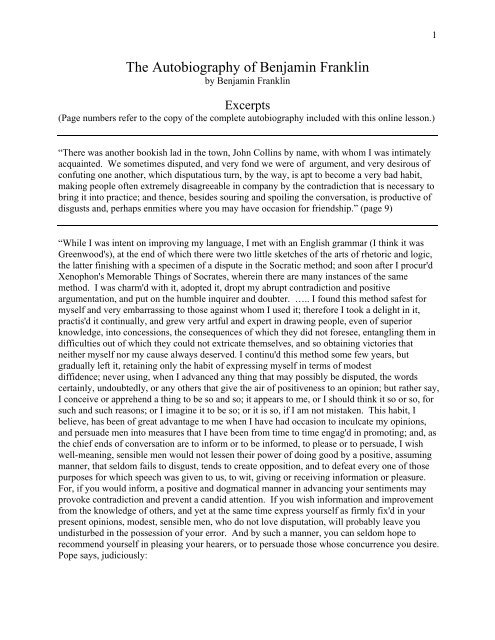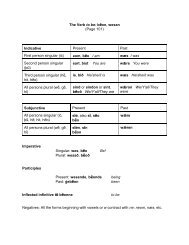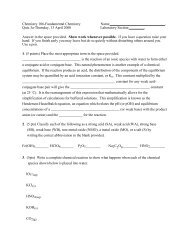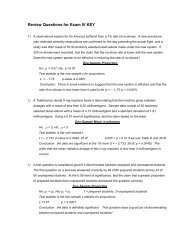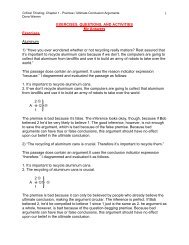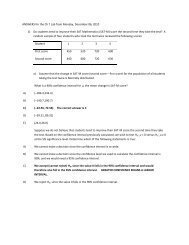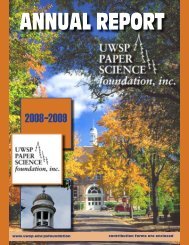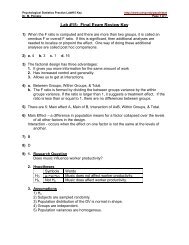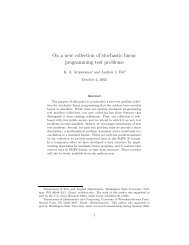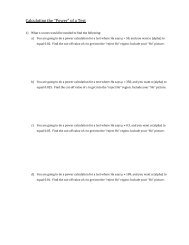The Autobiography of Benjamin Franklin - UWSP
The Autobiography of Benjamin Franklin - UWSP
The Autobiography of Benjamin Franklin - UWSP
Create successful ePaper yourself
Turn your PDF publications into a flip-book with our unique Google optimized e-Paper software.
<strong>The</strong> <strong>Autobiography</strong> <strong>of</strong> <strong>Benjamin</strong> <strong>Franklin</strong><br />
by <strong>Benjamin</strong> <strong>Franklin</strong><br />
Excerpts<br />
(Page numbers refer to the copy <strong>of</strong> the complete autobiography included with this online lesson.)<br />
“<strong>The</strong>re was another bookish lad in the town, John Collins by name, with whom I was intimately<br />
acquainted. We sometimes disputed, and very fond we were <strong>of</strong> argument, and very desirous <strong>of</strong><br />
confuting one another, which disputatious turn, by the way, is apt to become a very bad habit,<br />
making people <strong>of</strong>ten extremely disagreeable in company by the contradiction that is necessary to<br />
bring it into practice; and thence, besides souring and spoiling the conversation, is productive <strong>of</strong><br />
disgusts and, perhaps enmities where you may have occasion for friendship.” (page 9)<br />
“While I was intent on improving my language, I met with an English grammar (I think it was<br />
Greenwood's), at the end <strong>of</strong> which there were two little sketches <strong>of</strong> the arts <strong>of</strong> rhetoric and logic,<br />
the latter finishing with a specimen <strong>of</strong> a dispute in the Socratic method; and soon after I procur'd<br />
Xenophon's Memorable Things <strong>of</strong> Socrates, wherein there are many instances <strong>of</strong> the same<br />
method. I was charm'd with it, adopted it, dropt my abrupt contradiction and positive<br />
argumentation, and put on the humble inquirer and doubter. ….. I found this method safest for<br />
myself and very embarrassing to those against whom I used it; therefore I took a delight in it,<br />
practis'd it continually, and grew very artful and expert in drawing people, even <strong>of</strong> superior<br />
knowledge, into concessions, the consequences <strong>of</strong> which they did not foresee, entangling them in<br />
difficulties out <strong>of</strong> which they could not extricate themselves, and so obtaining victories that<br />
neither myself nor my cause always deserved. I continu'd this method some few years, but<br />
gradually left it, retaining only the habit <strong>of</strong> expressing myself in terms <strong>of</strong> modest<br />
diffidence; never using, when I advanced any thing that may possibly be disputed, the words<br />
certainly, undoubtedly, or any others that give the air <strong>of</strong> positiveness to an opinion; but rather say,<br />
I conceive or apprehend a thing to be so and so; it appears to me, or I should think it so or so, for<br />
such and such reasons; or I imagine it to be so; or it is so, if I am not mistaken. This habit, I<br />
believe, has been <strong>of</strong> great advantage to me when I have had occasion to inculcate my opinions,<br />
and persuade men into measures that I have been from time to time engag'd in promoting; and, as<br />
the chief ends <strong>of</strong> conversation are to inform or to be informed, to please or to persuade, I wish<br />
well-meaning, sensible men would not lessen their power <strong>of</strong> doing good by a positive, assuming<br />
manner, that seldom fails to disgust, tends to create opposition, and to defeat every one <strong>of</strong> those<br />
purposes for which speech was given to us, to wit, giving or receiving information or pleasure.<br />
For, if you would inform, a positive and dogmatical manner in advancing your sentiments may<br />
provoke contradiction and prevent a candid attention. If you wish information and improvement<br />
from the knowledge <strong>of</strong> others, and yet at the same time express yourself as firmly fix'd in your<br />
present opinions, modest, sensible men, who do not love disputation, will probably leave you<br />
undisturbed in the possession <strong>of</strong> your error. And by such a manner, you can seldom hope to<br />
recommend yourself in pleasing your hearers, or to persuade those whose concurrence you desire.<br />
Pope says, judiciously:<br />
1
"Men should be taught as if you taught them not,<br />
And things unknown propos'd as things forgot;"<br />
farther recommending to us<br />
"To speak, tho' sure, with seeming diffidence."<br />
And he might have coupled with this line that which he has coupled with another, I think, less<br />
properly,<br />
"For want <strong>of</strong> modesty is want <strong>of</strong> sense."<br />
If you ask, Why less properly? I must repeat the lines,<br />
"Immodest words admit <strong>of</strong> no defense,<br />
For want <strong>of</strong> modesty is want <strong>of</strong> sense."<br />
Now, is not want <strong>of</strong> sense (where a man is so unfortunate as to want it) some apology for his<br />
want <strong>of</strong> modesty? and would not the lines stand more justly thus?<br />
"Immodest words admit but this defense,<br />
That want <strong>of</strong> modesty is want <strong>of</strong> sense."<br />
This, however, I should submit to better judgments.” (pages 10-11)<br />
“Keimer [a printer with whom Frankin worked] and I liv'd on a pretty good familiar footing, and<br />
agreed tolerably well, for he suspected nothing <strong>of</strong> my setting up. He retained a great deal <strong>of</strong> his<br />
old enthusiasms and lov'd argumentation. We therefore had many disputations. I used to work<br />
him so with my Socratic method, and had trepann'd him so <strong>of</strong>ten by questions apparently so<br />
distant from any point we had in hand, and yet by degrees lead to the point, and brought him into<br />
difficulties and contradictions, that at last he grew ridiculously cautious, and would hardly<br />
answer me the most common question, without asking first, "What do you intend to infer from<br />
that?"” (page 21)<br />
“I should have mentioned before, that, in the autumn <strong>of</strong> the preceding year, I had form'd most <strong>of</strong><br />
my ingenious acquaintance into a club <strong>of</strong> mutual improvement, which we called the JUNTO; we<br />
met on Friday evenings. <strong>The</strong> rules that I drew up required that every member, in his turn, should<br />
produce one or more queries on any point <strong>of</strong> Morals, Politics, or Natural Philosophy, to be<br />
discuss'd by the company; and once in three months produce and read an essay <strong>of</strong> his own<br />
writing, on any subject he pleased. Our debates were to be under the direction <strong>of</strong> a president,<br />
and to be conducted in the sincere spirit <strong>of</strong> inquiry after truth, without fondness for dispute, or<br />
desire <strong>of</strong> victory; and, to prevent warmth, all expressions <strong>of</strong> positiveness in opinions, or direct<br />
2
contradiction, were after some time made contraband, and prohibited under small pecuniary<br />
penalties.” (page 35)<br />
<strong>The</strong> Junto continued more than forty years, “and was the best school <strong>of</strong> philosophy, morality, and<br />
politics that then existed in the province; for our queries, which were read the week preceding<br />
their discussion, put us upon reading with attention upon the several subjects, that we might<br />
speak more to the purpose; and here, too, we acquired better habits <strong>of</strong> conversation, every thing<br />
being studied in our rules which might prevent our disgusting each other.” (page 36)<br />
“<strong>The</strong> objections and reluctances I met with in soliciting the subscriptions [for a subscription<br />
library], made me soon feel the impropriety <strong>of</strong> presenting one's self as the proposer <strong>of</strong> any useful<br />
project, that might be suppos'd to raise one's reputation in the smallest degree above that <strong>of</strong> one's<br />
neighbors, when one has need <strong>of</strong> their assistance to accomplish that project. I therefore put<br />
myself as much as I could out <strong>of</strong> sight, and stated it as a scheme <strong>of</strong> a number <strong>of</strong> friends, who had<br />
requested me to go about and propose it to such as they thought lovers <strong>of</strong> reading. In this way<br />
my affair went on more smoothly, and I ever after practis'd it on such occasions; and, from my<br />
frequent successes, can heartily recommend it. <strong>The</strong> present little sacrifice <strong>of</strong> your vanity will<br />
afterwards be amply repaid. If it remains a while uncertain to whom the merit belongs, some one<br />
more vain than yourself will be encouraged to claim it, and then even envy will be disposed to do<br />
you justice by plucking those assumed feathers, and restoring them to their right owner.” (page<br />
46)<br />
“in conversation [virtue] was obtain'd rather by the use <strong>of</strong> the ears than <strong>of</strong> the tongue” (page 48)<br />
“My list <strong>of</strong> virtues contain'd at first but twelve; but a Quaker friend having kindly informed me<br />
that I was generally thought proud; that my pride show'd itself frequently in conversation; that I<br />
was not content with being in the right when discussing any point, but was overbearing, and<br />
rather insolent, <strong>of</strong> which he convinc'd me by mentioning several instances; I determined<br />
endeavouring to cure myself, if I could, <strong>of</strong> this vice or folly among the rest, and I added Humility<br />
to my list, giving an extensive meaning to the word. [<strong>Franklin</strong> describes humility as “imitating<br />
Jesus and Socrates.]” (page 49)]<br />
I cannot boast <strong>of</strong> much success in acquiring the reality <strong>of</strong> this virtue, but I had a good deal with<br />
regard to the appearance <strong>of</strong> it. I made it a rule to forbear all direct contradiction to the sentiments<br />
<strong>of</strong> others, and all positive assertion <strong>of</strong> my own. I even forbid myself, agreeably to the old laws <strong>of</strong><br />
our Junto, the use <strong>of</strong> every word or expression in the language that imported a fix'd opinion, such<br />
as certainly, undoubtedly, etc., and I adopted, instead <strong>of</strong> them, I conceive, I apprehend, or I<br />
imagine a thing to be so or so; or it so appears to me at present. When another asserted<br />
something that I thought an error, I deny'd myself the pleasure <strong>of</strong> contradicting him abruptly, and<br />
<strong>of</strong> showing immediately some absurdity in his proposition; and in answering I began by<br />
observing that in certain cases or circumstances his opinion would be right, but in the present<br />
3
case there appear'd or seem'd to me some difference, etc. I soon found the advantage <strong>of</strong> this<br />
change in my manner; the conversations I engag'd in went on more pleasantly. <strong>The</strong> modest way<br />
in which I propos'd my opinions procur'd them a readier reception and less contradiction; I had<br />
less mortification when I was found to be in the wrong, and I more easily prevail'd with others to<br />
give up their mistakes and join with me when I happened to be in the right.<br />
And this mode, which I at first put on with some violence to natural inclination, became at length<br />
so easy, and so habitual to me, that perhaps for these fifty years past no one has ever heard a<br />
dogmatical expression escape me. And to this habit (after my character <strong>of</strong> integrity) I think it<br />
principally owing that I had early so much weight with my fellow-citizens when I proposed new<br />
institutions, or alterations in the old, and so much influence in public councils when I became a<br />
member; for I was but a bad speaker, never eloquent, subject to much hesitation in my choice <strong>of</strong><br />
words, hardly correct in language, and yet I generally carried my points.”(pages 54-55)<br />
“<strong>The</strong>se embarrassments that the Quakers suffer'd from having establish'd and published it as one<br />
<strong>of</strong> their principles that no kind <strong>of</strong> war was lawful, and which, being once published, they could<br />
not afterwards, however they might change their minds, easily get rid <strong>of</strong>, reminds me <strong>of</strong> what I<br />
think a more prudent conduct in another sect among us, that <strong>of</strong> the Dunkers. I was acquainted<br />
with one <strong>of</strong> its founders, Michael Welfare, soon after it appear'd. He complain'd to me that they<br />
were grievously calumniated by the zealots <strong>of</strong> other persuasions, and charg'd with abominable<br />
principles and practices, to which they were utter strangers. I told him this had always been the<br />
case with new sects, and that, to put a stop to such abuse, I imagin'd it might be well to publish<br />
the articles <strong>of</strong> their belief, and the rules <strong>of</strong> their discipline. He said that it had been propos'd<br />
among them, but not agreed to, for this reason: "When we were first drawn together as a<br />
society," says he, "it had pleased God to enlighten our minds so far as to see that some doctrines,<br />
which we once esteemed truths, were errors; and that others, which we had esteemed errors, were<br />
real truths. From time to time He has been pleased to afford us farther light, and our principles<br />
have been improving, and our errors diminishing. Now we are not sure that we are arrived at the<br />
end <strong>of</strong> this progression, and at the perfection <strong>of</strong> spiritual or theological knowledge; and we fear<br />
that, if we should once print our confession <strong>of</strong> faith, we should feel ourselves as if bound and<br />
confin'd by it, and perhaps be unwilling to receive farther improvement, and our successors still<br />
more so, as conceiving what we their elders and founders had done, to be something sacred,<br />
never to be departed from."<br />
This modesty in a sect is perhaps a singular instance in the history <strong>of</strong> mankind, every other sect<br />
supposing itself in possession <strong>of</strong> all truth, and that those who differ are so far in the wrong; like a<br />
man traveling in foggy weather, those at some distance before him on the road he sees wrapped<br />
up in the fog, as well as those behind him, and also the people in the fields on each side, but near<br />
him all appears clear, tho' in truth he is as much in the fog as any <strong>of</strong> them.” (page 69)<br />
“In my journey to Boston this year, I met at New York with our new governor, Mr. Morris, just<br />
arriv'd there from England, with whom I had been before intimately acquainted. He brought a<br />
commission to supersede Mr. Hamilton, who, tir'd with the disputes his proprietary instructions<br />
subjected him to, had resign'd. Mr. Morris ask'd me if I thought he must expect as uncomfortable<br />
4
an administration. I said, "No; you may, on the contrary, have a very comfortable one, if you<br />
will only take care not to enter into any dispute with the Assembly." "My dear friend," says he,<br />
pleasantly, "how can you advise my avoiding disputes? You know I love disputing; it is one <strong>of</strong><br />
my greatest pleasures; however, to show the regard I have for your counsel, I promise you I will,<br />
if possible, avoid them." He had some reason for loving to dispute, being eloquent, an acute<br />
sophister, and, therefore, generally successful in argumentative conversation. He had been<br />
brought up to it from a boy, his father, as I have heard, accustoming his children to dispute with<br />
one another for his diversion, while sitting at table after dinner; but I think the practice was not<br />
wise; for, in the course <strong>of</strong> my observation, these disputing, contradicting, and confuting people<br />
are generally unfortunate in their affairs. <strong>The</strong>y get victory sometimes, but they never get good<br />
will, which would be <strong>of</strong> more use to them.” (pages 78-79)<br />
5


